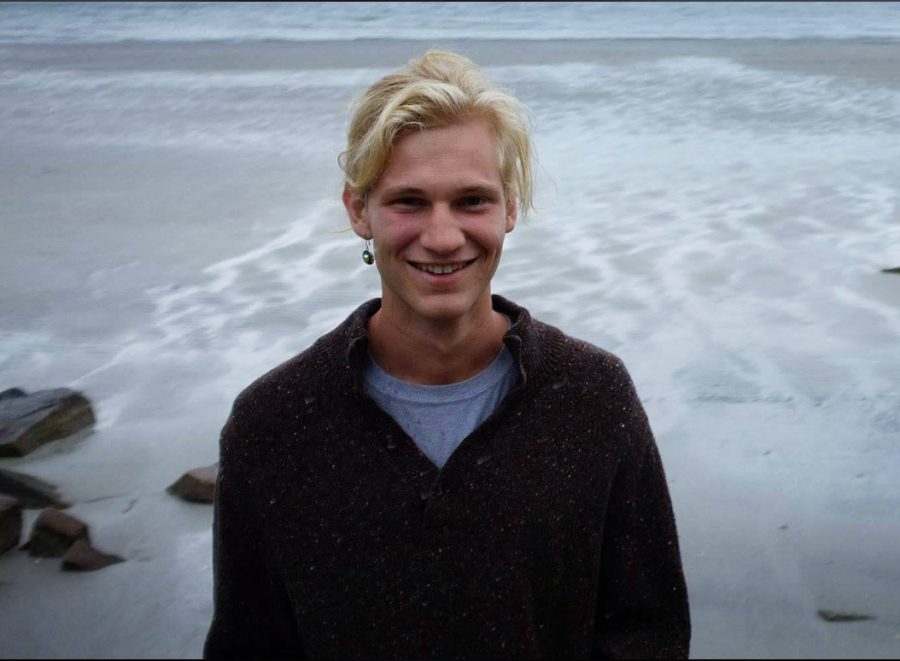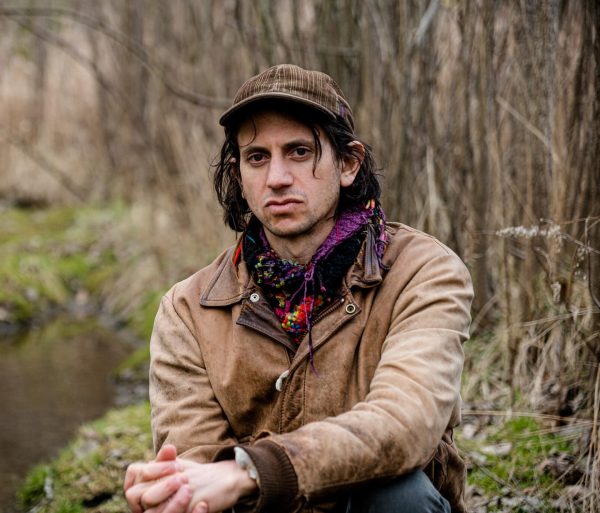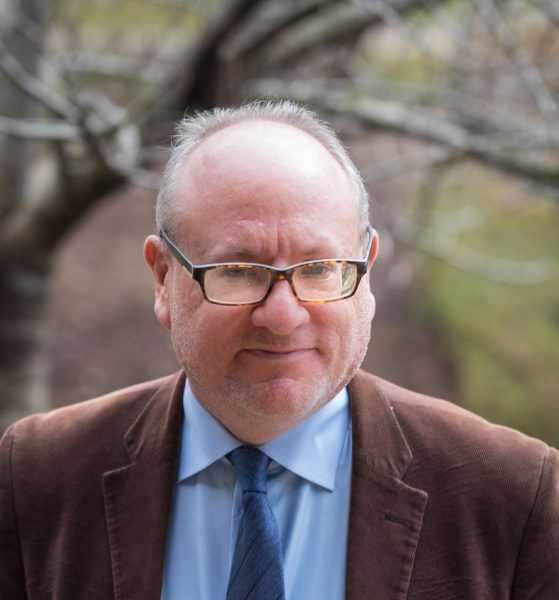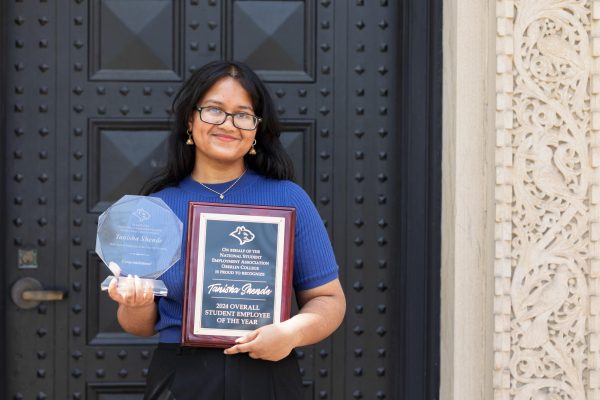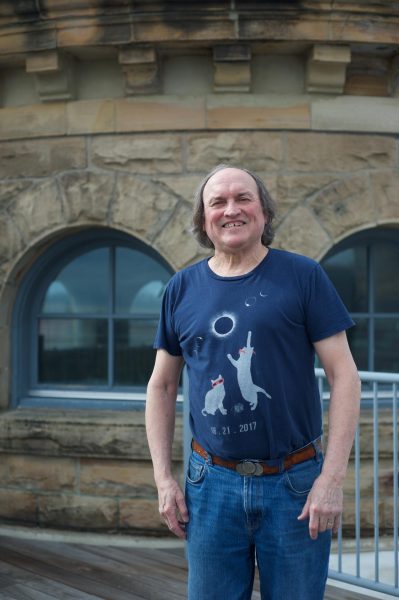Sam Bailey, OC ’19, Sustained Dialogue Coordinator
Sam Bailey
What does your work as Dialogue Coordinator entail?
Mainly, I coordinate a program called Barefoot Dialogue, which I was involved in when I was a first-year as a participant, and then a facilitator and researcher. And now — having graduated last year — I’ve stepped into a coordinator position, which is a staff position on campus. It’s a crazy job because the range of duties is wild.
I host some dialogues — we believe in home-cooked food for dialogue and we’re a vulnerability-based model — and we feel like the first step into vulnerability is sort of like an opening of a home. So I have dialogues in my apartment and also host the cooking of a meal. And often there’s this idea we can’t talk politics — not that we only talk politics — but we can’t have serious discussion over a meal. Barefoot tries to be intentional about that and bring forth food as a uniting factor and also something to talk over.
Could you talk about the “fierce generosity” Thanksgiving potluck theme?
This event is one of the multiple things that I do as Barefoot coordinator. I think one of the great things is helping to organize events like this. Maysan Haydar, who’s Multifaith Coordinator at the Office of Religious and Spiritual Life, and [Director of Religious Life] David Dorsey, and Mandy Walusimbi, who works in the Dean’s office — all these people helped. So I wasn’t the only person.
We have a theme every year for the potluck. What I think is good is it’s not like me explaining what fierce generosity is, or any of the people organizing the potluck. Rather we step into this whole conversation with speakers [double-degree fourth-year] Joshua [Reinier] and [College second-year] Serena Zets speaking on it; and [Associate Professor of History] Zeinab [Abul-Magd] and [College fourth-year] Noa [Gordon-Guterman] and Edyie Woodall. All of our speakers were asked to think about what fierce generosity means to them and where they found generosity in places that they might not necessarily expect it. And also what does that word “fierce” mean? It’s an interesting word. What’s cool about an event like this is that we’re really offering it to all the individual voices, not claiming any one definition for something, but sort of holding up all the different voices that might have an idea.
This event is a multi-faith gathering, so I’m curious: What does that mean in practice? What are some of the ways that it can manifest when you’re at the event?
I think this is really an opportunity to have a podium and a microphone, and to include staff and faculty and students and community members in recognizing a whole handful of people existing in what we call the “Oberlin community.” I think it’s important to offer up a public setting where we come from different faiths. So I think tonight like — pluralism, Buddhism, Hinduism, Islam, Judaism, Christianity — they were all represented. And so there’s a chance for these voices to all come across an audience that is also religiously diverse — you know, the different religious clubs on campus, etc. — sort of gathering for this moment. And also a lot of pastors. I sat right next to pastors in town and stuff like that. I don’t need us all to come together and hold hands, all that kind of stuff. I mean, not that that’s bad, but I don’t think this event is just wanting us all to just to conform around one thing or recognize only our sameness, but rather hold up our differences in the same room around food in a really warm way in support of one another and our different faith practices and beliefs. And I think that’s what a multifaith gathering means.
How do events like this encourage interfaith dialogue?
So the program I coordinate, Barefoot Dialogue, started off as solely an interfaith dialogue group where we had around a circle no more than three faiths represented in a dialogue of about 12 to 16 students who had dialogue across difference. The dialogues promoted holding up individual voices, not seeking any sort of agreement like, “Okay, let’s believe this about the afterlife,” or whatever. Rather, it’s about just really listening and trying to understand your experience, your faith background, and your perspective on maybe the afterlife — which may be very different than mine, but it’s important to get in the same room and cultivate a belief in dialogue. So this event was co-sponsored by Barefoot and the Interfaith Student Council. Barefoot also still has interfaith groups. And interfaith work is not only sitting in a circle, but rather activism on the ground or whatever that may look like.
I think this event is almost a public dialogue — not that there’s a real response, but I think what was shared tonight was a beautiful stacking of voices together on a theme about fierce generosity. And people were really using a lot of “I” voice language, which we use in Barefoot Dialogue, to explain their experiences with the idea of fierce generosity. Like Zeinab, who was the Muslim speaker tonight, spoke of her father who supported her coming from Egypt to America and holding up her passion for politics and then getting a Ph.D. and just all the support that her father gave her.
How has your perspective shifted now that you’ve graduated?
I think that it’s so interesting because a lot of the events that I am involved in now, whether it be Barefoot or Office of Religious and Spiritual Life events and the Thanksgiving potluck — I’ve landed in the same places that I was as a student. So I really have done four years of experiencing an event like the multi-faith potluck. But now being in a fifth-year staff position, I think that what amazes me is the work that the staff and administration do. As a student I didn’t get the opportunity to see everybody thinking things through. Not that I didn’t think they were thought out, but hearing the conversations and sitting in the conference rooms and seeing the sweat of running across campus. That’s a bit dramatic, but it’s very true. And I think that what all that people on the staff level do for students is pretty incredible. I think that we staff make a lot of mistakes, too, you know. As a student I felt that. But I don’t think that I carried the empathy that I did for staff people as much as I do this year.
Because you’re in those shoes now?
Yeah, and it doesn’t mean that I always agree with staff and administration — like there were some things that I didn’t agree with — and I don’t feel like I have to now, as staff. But I do appreciate the level of energy put into things.
Is there anything else that you’d like to add?
I think that it’s been really cool dedicating my year at Oberlin as staff to just helping to support spaces where anybody can come using their “I” voice and speak for who they are. They don’t have to speak for a world behind them or a whole people or anything like that, but rather can just be like, “I’m Sam in this moment.”
I love Oberlin and I think that we do all the things we do for really important and good reasons. There’s a moment that needs to be crafted here a moment to just be yourself, though that sounds cheesy. Being like, “This is what I want to share with you, and maybe there’s some really important information within me that needs to come out.” And I think that Barefoot Dialogue supports that, and other people around this campus in other capacities support that too. Just devoting a year to that, I feel like I’ve been lucky and believe in what I’m doing.


